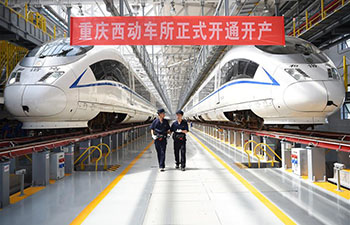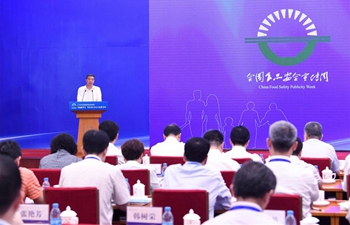SAN FRANCISCO, July 17 (Xinhua) -- U.S. and Chinese experts on Tuesday pledged to continue dialogue on climate change and uphold the Paris Agreement on global greenhouse gas emissions.
The scholars and professionals spoke at the China-U.S. High-Level Dialogue on Energy and Climate Change in San Francisco this week, an ongoing affair since September 2015, to discuss enhancing bilateral cooperation on climate change and energy.
In September 2014, China and the U.S. "shocked the world by jointly announcing their support in achieving a global agreement now known as the Paris Agreement on Climate Change," said Andrew Light, Professor of Philosophy, Public Policy and Atmospheric Sciences at George Mason University.
He said the participants agreed that the current global situation has become more complicated, and they will watch what U.S. President Donald Trump's administration, which has withdrawn from the Paris Agreement, is doing or not doing on climate change and energy.
The participants also discussed the several cooperative mechanisms in existence between the U.S. and China, with more room for engagement at the state, provincial and municipal level as well as with the private sector, he said.
Pete Ogden, vice president of Energy, Climate and the Environment of the United Nations Foundation, said the conversations on climate change between the two countries were "robust."
Zhou Dadi, professor of the Energy Research Institute at China's National Development and Reform Commission, said the Chinese government will not leave the accord like the U.S. because the Paris Agreement is based on science.
He said China is addressing the issue of greenhouse gas emissions and will continue to work with its international partners on the issue.
"China will play a more active, to some extent, some kind of leading role" and cooperate with other countries to enhance "our ambitious obligations" in the future.
China will meet its 2020 target of cutting greenhouse gases, which is projected to fall by 50 percent, more than its stated goal of 44 percent.
He said China is already the world's largest electric vehicles market, which will help build a low-carbon economy.
Zhang Xiliang, director of Institute for Energy, Environment and Economy of Tsinghua University, told Xinhua that U.S. scholars, industry experts and government officials all acknowledged the achievements China has made in the past few years in reducing greenhouse gas emissions and pursuing green energy.
Both the U.S. and Chinese governments have reached a consensus on reaching the target of reducing carbon emissions by 60 or 65 percent before 2030, Zhang said.
In implementing the Paris Agreement targets, China is seeking ways to gradually establish a national carbon-emission trading mechanism to control the discharge of carbon at a relatively low cost, he added.
China will give priority to harnessing carbon emissions for about 7,500 key enterprises, including the electric and steel sectors, whose emissions account for about half of the country's total, Zhang said.
The establishment of a carbon-emission trading market gives the government an additional means to implement its obligations under the Paris Agreement, said the Chinese scholar.
The China-U.S. High-Level Dialogue, which came two months ahead of the Global Climate Action Summit that is to be held in San Francisco on Sept. 12-14, discussed opportunities for continued cooperation with or without the participation of the U.S. federal government to secure a low-carbon, high-growth and sustainable future.
The dialogue underlined cooperation between China and the U.S. on these critically important issues.

















